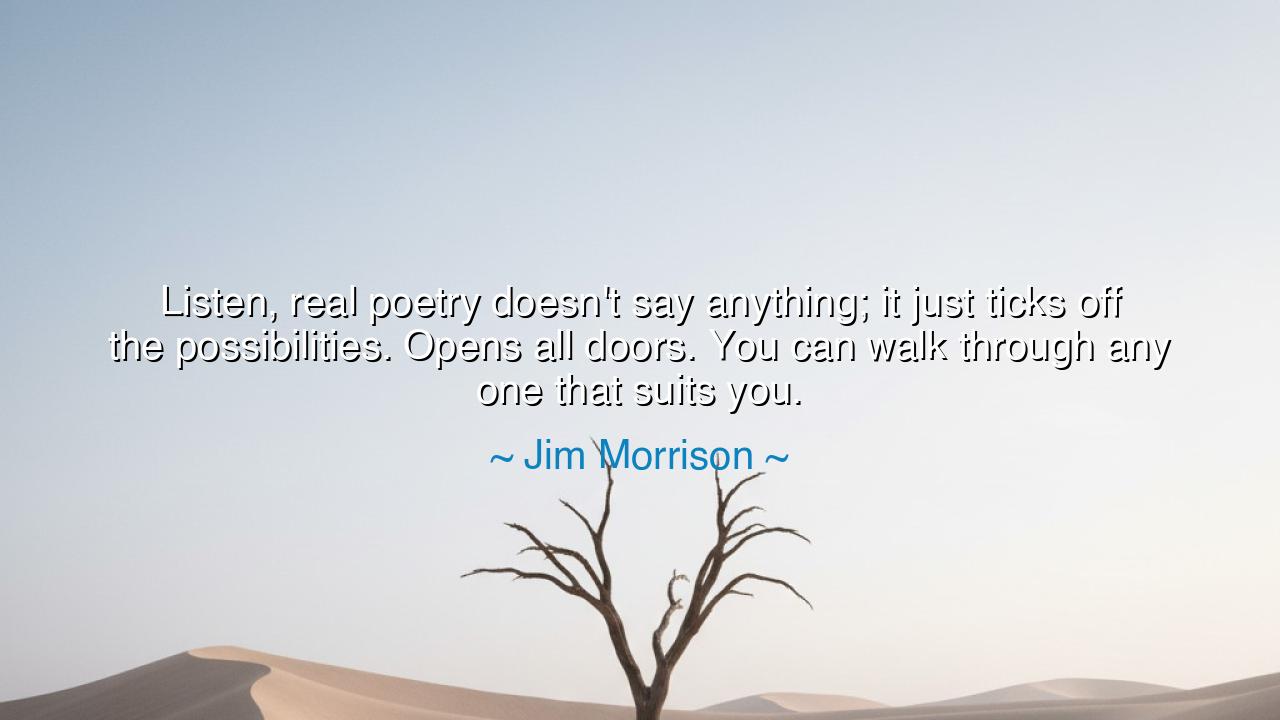
Listen, real poetry doesn't say anything; it just ticks off the
Listen, real poetry doesn't say anything; it just ticks off the possibilities. Opens all doors. You can walk through any one that suits you.






Jim Morrison, the poet-shaman of rock and roll, once proclaimed: “Listen, real poetry doesn’t say anything; it just ticks off the possibilities. Opens all doors. You can walk through any one that suits you.” These words carry the mystic fire of a man who lived with one foot in the ordinary world and one in the realm of visions. For Morrison knew that poetry is not a cage of meaning, but a key. It does not dictate, it liberates. It does not imprison thought with rigid answers, but awakens the mind to infinite paths, infinite interpretations, infinite worlds.
The ancients knew this truth as well. The riddles of the oracle at Delphi never gave straight commands; they hinted, suggested, and offered possibilities. One seeker might hear a warning, another a promise, and both could be right. So too with poetry: it does not force the reader into submission, but opens doors, so that each soul may find the passage that speaks to its own destiny. Morrison’s insight reminds us that art is not doctrine, but invitation.
Consider the plays of Shakespeare. What is Hamlet? To some, it is a meditation on death. To others, a study of madness, or betrayal, or conscience. The play says nothing final, but in its ambiguity it opens countless doors. Generations have walked through, each finding a different truth, yet all nourished. This is the power of real poetry—it refuses to close, it refuses to narrow itself to one meaning. It is not a locked room, but a hall of infinite gateways.
Morrison himself lived this in his music. His lyrics were dreamlike, often fragmented, more spell than speech. In “The End,” he weaves a river of images—death, love, apocalypse, rebirth. What does it mean? Perhaps everything, perhaps nothing. But the listener, hearing those words, finds a door that suits them. For one it may be liberation, for another despair, for another transcendence. This was Morrison’s gift: to remind us that art’s strength lies not in telling us what to think, but in awakening us to think for ourselves.
The lesson is that poetry—and by extension, life itself—must be approached not as a fixed answer, but as a field of possibilities. To demand a single meaning from a poem is like demanding that the sky be painted only one color. To demand a single path from life is to blind yourself to the multitude of doors waiting to be opened. Morrison urges us to embrace the openness, to see that real truth is not in confinement but in expansion.
Practically, this means reading poems not as puzzles to be solved, but as companions to be journeyed with. When you encounter a verse, do not rush to pin it down; instead, ask yourself: what door is opening here, for me, today? And in your own life, when choices present themselves, do not fear the multitude of paths. See them as Morrison saw them—many doors, each valid, each with its own lessons. Walk through boldly, knowing that the meaning is not given but made by your journey.
Thus, remember Morrison’s wisdom: “Real poetry doesn’t say anything; it just ticks off the possibilities. Opens all doors.” The poet is not a preacher but a guide; the poem is not a command but a threshold. Enter the hall of language with reverence, and choose your door. For in the choosing, in the walking, you make your own truth. And that, in the end, is the highest gift poetry can give: not answers, but freedom.






HDHoang Danh
Morrison’s view of poetry is intriguing—he implies that poetry should not be restrictive but should encourage exploration. How does this idea change how we interpret poems? Instead of looking for a singular truth, do we find more value in how poetry opens us to different perspectives? Could this mean that true poetry is not about finding the ‘right’ answer but about exploring all the possibilities it presents?
Q_Phuong Quyen _8B
Morrison’s idea that real poetry ‘just ticks off the possibilities’ resonates with me because it emphasizes the infinite nature of art. Could it be that poetry is meant to be more of an experience than a statement? Does poetry’s power come from how it engages our imagination and emotions, offering us pathways rather than conclusions? How can we embrace this freedom in our own interactions with poetry?
LLVu luu ly
I love the concept of poetry as something that doesn't dictate but rather presents possibilities. Is Morrison suggesting that poetry, by leaving things open-ended, allows each reader to find their own meaning or path? How often do we approach poetry expecting answers, when it’s really about the freedom to choose our own interpretations? Is this part of what makes poetry so powerful and deeply personal?
ALVo Anh Linh
Morrison’s quote about poetry feels liberating—it suggests that poetry isn’t about a fixed message or conclusion but about exploration. The idea that poetry opens doors rather than gives direct answers is fascinating. Does this mean that the true value of poetry lies in the journey it offers, rather than the destination? Could it be that the beauty of poetry is in its ability to invite personal interpretation and choice?